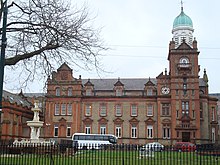Masonic Female Orphan School of Ireland
| Masonic Female Orphan School of Ireland | |
|---|---|
 | |
| Location | |
 | |
| Coordinates | 53°19′32″N 6°13′29″W / 53.32556°N 6.22472°W |
| Information | |
| Type | Former orphanage school |
| Established | 1792 |
| Gender | Female |
| Age | 10 to 15 |
The Masonic Female Orphan School of Ireland was a Masonic school in Dublin, Ireland. The school was instituted in 1792, with the aim of maintaining the daughters of indigent Freemasons, unable through death, illness, or incapacitation to support their families.
History[]
In 1788 Bartholomew Ruspini and nine fellow Freemasons met in London to discuss plans for establishing a charitable institution for the daughters of Masons who had fallen on hard times or whose death had meant hardship for their families. In 1790 several Irish Brethren met together and made themselves responsible for the school fees for girls. In 1792, a small house, affording accommodation for twenty girls, was taken in Dublin where the pupils were boarded. clothed and educated until such time as they could earn their own living.[citation needed]
The children had to be between the ages of six and ten and retained until they reached the age of fifteen and had to be the daughters of freemasons. At the end of their school life, girls were either returned to their family or supporters (known as Friends) or apprenticed and supported until they could establish themselves.[1]

In 1852, after several removals, Burlington House in Burlington Place, Ballsbridge, was opened. The original architect was George Papworth. Extensive alterations were carried out by John McCurdy in 1861. An impressive newly built school was opened in 1881.[2]
Bazaars and fairs were held to provide funds for the school.[3] On 16 May 1892 the Masonic Centenary five-day Bazaar opened at the Royal Dublin Society grounds, adjacent to the school. The opening was presided over by the Grand Master, the Duke of Abercorn. Among the highlights were reconstructions of historic Dublin buildings, a human chess game, and landscaped gardens. Some 96,000 passed through the turnstiles over the five days. A profit of over £21,690 was made from the 50 stalls and turnstile tickets.[4]
References[]
- ^ Encyclopedia of Freemasonry
- ^ Thomas Stuart: Masonic Female Orphan School of Ireland: Grand Centenary Celebration. Wilson Hartnell, 1892.
- ^ Stephanie Rains: Commodity Culture and Social Class in Dublin 1850-1916. Irish Academic Press, Dublin, 2010. ISBN 978-0716530695 p. 119
- ^ Dublin City Public Libraries - Dublin Heritage Archived 2007-06-28 at the Wayback Machine
External links[]
- Freemasonry in Ireland
- Masonic educational institutions
- 1792 establishments in Ireland
- Ballsbridge
- Hotels in Dublin (city)
